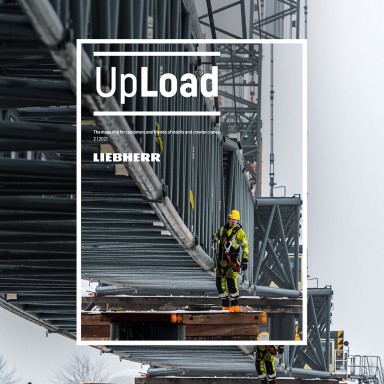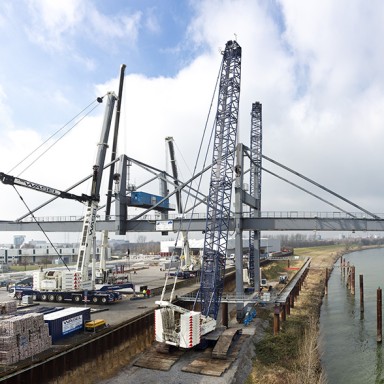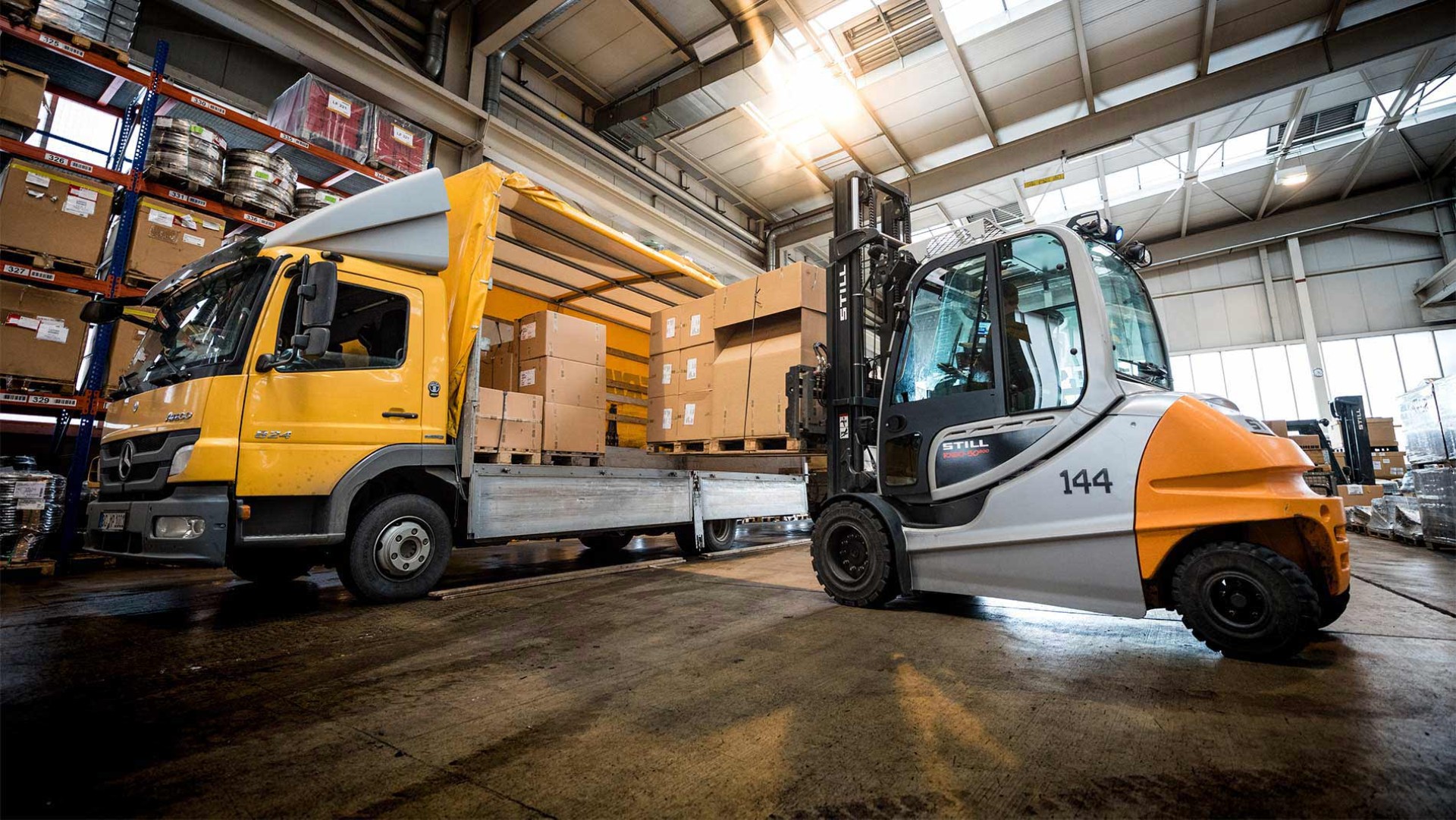
14 minutes | magazine 02/2021
The Enablers
The coronavirus pandemic has now had a firm grip on our everyday lives for around a year and a half. This grip has differed between countries and the waves of the pandemic have occurred at various levels. Nevertheless, during 2020 around 2000 mobile and crawler cranes still left our crane production plant in Ehingen and were delivered to customers all over the world. Sometimes this process involved obstacles or circuitous routes, because our local service and many of our training courses also had to change very suddenly.
But we still managed to keep almost everything working. All thanks to being prepared to use new methods and creative ideas, the great motivation of our personnel and our close contacts with you, our customers and partners. So it is high time we had a word with some of our Ehingenbased “enablers” – Stefan Dambacher (Purchasing Manager), Giulio de Fiore (Logistics Manager), Benjamin Buchmüller (Shipment Manager), Stephan Höchstädter (Customer Service Manager) and Christoph Behmüller (Training Manager). Together they gave us an insight into this challenging situation.
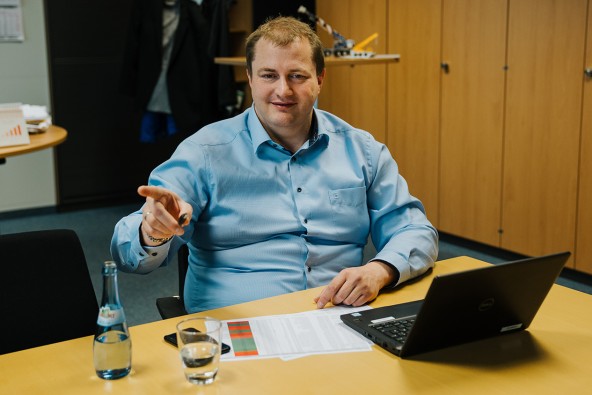
Stefan Dambacher (Purchasing Manager)
In Germany to date the pandemic has been divided into three waves – spring 2020, autumn/winter 2020 and spring 2021. Apart from a few days in the first wave, production at the plant in Ehingen has always continued smoothly. How were you able to maintain this?
Dambacher: We discovered at an early stage that there were major regional differences not only in the character of the pandemic, but also in how it was being approached. From complete lockdown with industry closed, to minor restrictions on cross-border traffic. That meant that the challenge for us was, and continues to be, transporting all materials for production and service to Ehingen promptly – so that we could make cranes using them. We have also had to keep a close eye on the entire supply chain for every component, regardless of how large or small it is. As soon we spot any signs of problems, we have had to take immediate action. Our long term partnerships with our suppliers have been a great help to us in this respect. Together we have managed to avoid any delivery problems to date.
De Fiore: In the Logistics Department, of course, the initial mood was one of chaos. At least as far as actually dealing with the situation was concerned. But we quickly created some level of safety for our personnel in the Logistics Department – hygiene rules were implemented and masks, disinfectant and gloves were made mandatory. Even though these initially had to be sourced using platforms like eBay, safety took precedence. Trucks were only cleared for unloading and loading if drivers observed social distancing and wore a mask covering their mouth and nose. Compliance with these measures meant it did not matter which country the freight originated from as everything was received using exactly the same conditions.
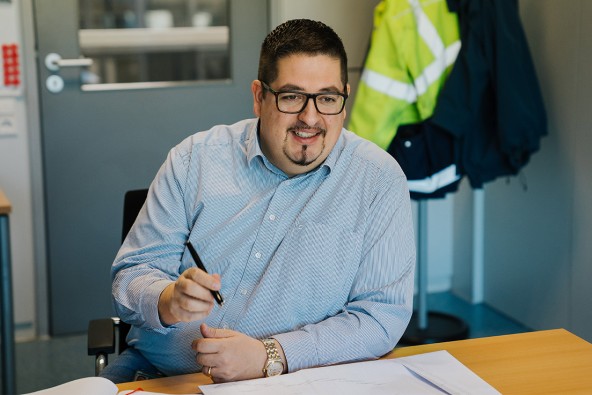
Giulio de Fiore (Logistics Manager)
Many countries temporarily closed their borders, including within the EU and in the Schengen Area. What do closed borders mean for the flow of goods to the factory?
De Fiore: We quickly noticed that the whole system became even more volatile. Time lost on the road meant that we had trucks queueing to enter the factory site. This meant that the commissioning times, in other words the time between their arrival at the plant and the actual demand for the goods in the production process or for spare parts shipments, were significantly reduced. That resulted in more rushing and stress for our workforce. In addition, there was an increase in special unloading operations, particularly towards the end of the late shift.
Dambacher: Normally, the flow of goods is very precisely controlled. As a result of the border closures and testing obligations for truck drivers, some transport times increased dramatically. That meant that we always had to include several days buffer time for goods from the regions concerned. But this also meant changing the procedures at Ehingen and the mass arrivals mentioned above.
Behmüller: It has also been a real challenge for our training courses. Our crane customers, but also our fitters from around the world, were unable to come to our Ehingen training centre as they had done in the past. That made it a matter of course for us as the global market leader to support them in these challenging conditions by continuing to provide a wide range of training courses.
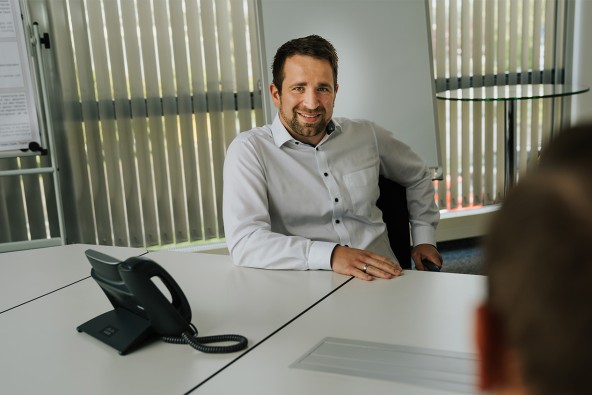
Christoph Behmüller (Training Manager)
For example, we quickly prepared a large number of digital responses to our familiar face-to-face training and the majority of these courses were then made available from April 2020. By taking new, digital measures we were also able to continue to offer a wide range of face-to-face, live online and e-learning courses. Furthermore, we are treading new paths involving live streaming and combining time-tested face-to-face courses with digital attendance opportunities. That means that we can provide the perfect model for everybody, wherever they may be in the world. Obviously, that also means taking into account the technical facilities available. By offering video tutorials for all new developments, we are able to provide our fitters with fast, reliable and prompt training all over the world for the main changes and new features in our products. Lots of short topics are now permanently available in our Mediathek in the form of live online courses. But face-toface courses for our customers continued to be possible using our sophisticated training concept, including booking larger premises here in the region and now using the rapid testing facilities.
With our logistics partners, the national companies and the support of our customers, we managed to find alternative delivery methods together, even in the most difficult of cases.
How can crane deliveries continue to be possible despite the restrictions on the transport of goods?
Buchmüller: Fortunately, our exports to overseas faced very few restrictions due to the pandemic. Shipments from Europe to all over the world continued to be possible, but numbers were reduced and longer lead times were required than normal. However, we took this into account by agreement with our forwarding partners. The greater challenge was definitely our crane deliveries within Europe, particularly in view of the lack of accommodation and return travel facilities for our drivers. Hotels were closed in many countries and the trains and flights back to Germany were extremely restricted and in some cases did not exist at all. Then there was also the fact that the travel regulations imposed by various countries changed on an almost daily basis. In the first year of the pandemic, we drove our cranes to 29 countries in Europe alone. With our logistics partners, the national companies and the support of our customers, we managed to find alternative delivery methods together, even in the most difficult of cases. For example, we transported machines on special low loaders, used shipping facilities wherever possible and even handed over cranes at the border so as not to be affected by quarantine measures when entering countries.

Stephan Höchstädter (Leiter Customer Service)
Closed borders, yet reliable spare parts supplies and crane repairs by experts from Ehingen. How has all this been possible?
Höchstädter: Long before the start and completely independently of the pandemic, we took the decision to be as close as possible to our customers by means of having our own global service network providing them with service with maximum competence. The establishment of this local competence took many years of hard work and will never be completely finished. Local parts stocking is a matter for permanent improvement whilst parts which mean downtime are held locally wherever possible. That has enabled us to achieve a situation where well over 90 percent of all service work is carried out locally – even during a pandemic.
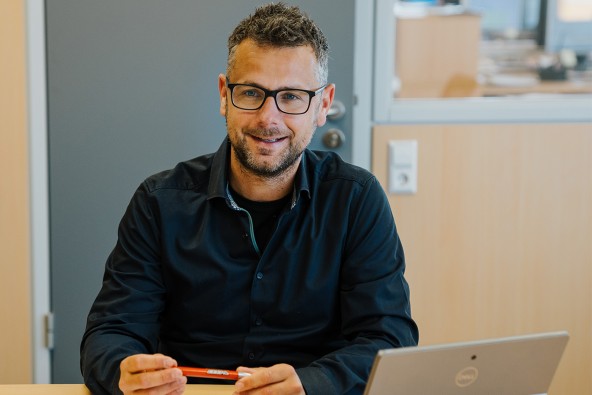
Benjamin Buchmüller (Shipment Manager)
Buchmüller: In general we can say that the transport of goods by truck within Europe has worked fairly well throughout the entire pandemic. Fortunately, the borders were never completely closed to trucks. However, in some cases there were long tailbacks at border crossings. The difficulties for supplying spare parts during the pandemic were therefore mainly caused by other factors, including the massive reduction in passenger flights. Before the pandemic, up to 50 percent of global air freight was flown in the freight compartments of passenger aircraft in the form of “belly freight”. This capacity disappeared overnight at the start of the pandemic. In addition to massive increases in price, this also resulted in significant delays.
This situation has at least stabilised, albeit at a fairly low level, over the course of the last year. Furthermore, the trend towards online trade, which was accelerated by the pandemic, has also resulted in shortages in capacity for the parcel, courier and express services which are important for our spare parts deliveries. I believe that this trend will continue after the pandemic is over and will require new and creative long term solutions to ensure excellent spare parts logistics.
So you could say that we have been providing remote support services for decades. Providing remote advice and online support for crane diagnostics and settings are key technologies for us which we provide all over the world and keep up to date at all times.
90 percent of service work is completed by local Liebherr branches spread all over the world. In addition to remote services, was this the key to successfully dealing with the crisis?
Höchstädter: The short answer is yes. But the preparations for this, too, were completed long before travel restrictions were imposed. We permanently invest in the quality of our close-knit network of in-house service outlets and also in a small number of highly qualified service partners. Our customers appreciate the fact that lots of technical problems can be solved on the telephone by our service specialists. So you could say that we have been providing remote support services for decades. If the deployment of a service technician is required, we benefit from the fact that they are available at regional bases, thus reducing travel distances. Crossing national borders is not necessary for many jobs. That helps to keep the service costs low for the customer and also enabled us to provide our service in our familiar quality even during the pandemic.
In addition, our cranes have lots of remote diagnostic features which are standard in our new cranes. We can deliver value for money retrofits for cranes which have been in our customers’ fleets for decades. Providing remote advice and online support for crane diagnostics and settings are key technologies for us which we provide all over the world and keep up to date at all times. Our digital services deliver added value and give our customers additional safety for difficult and time-critical jobs, particularly at this time.
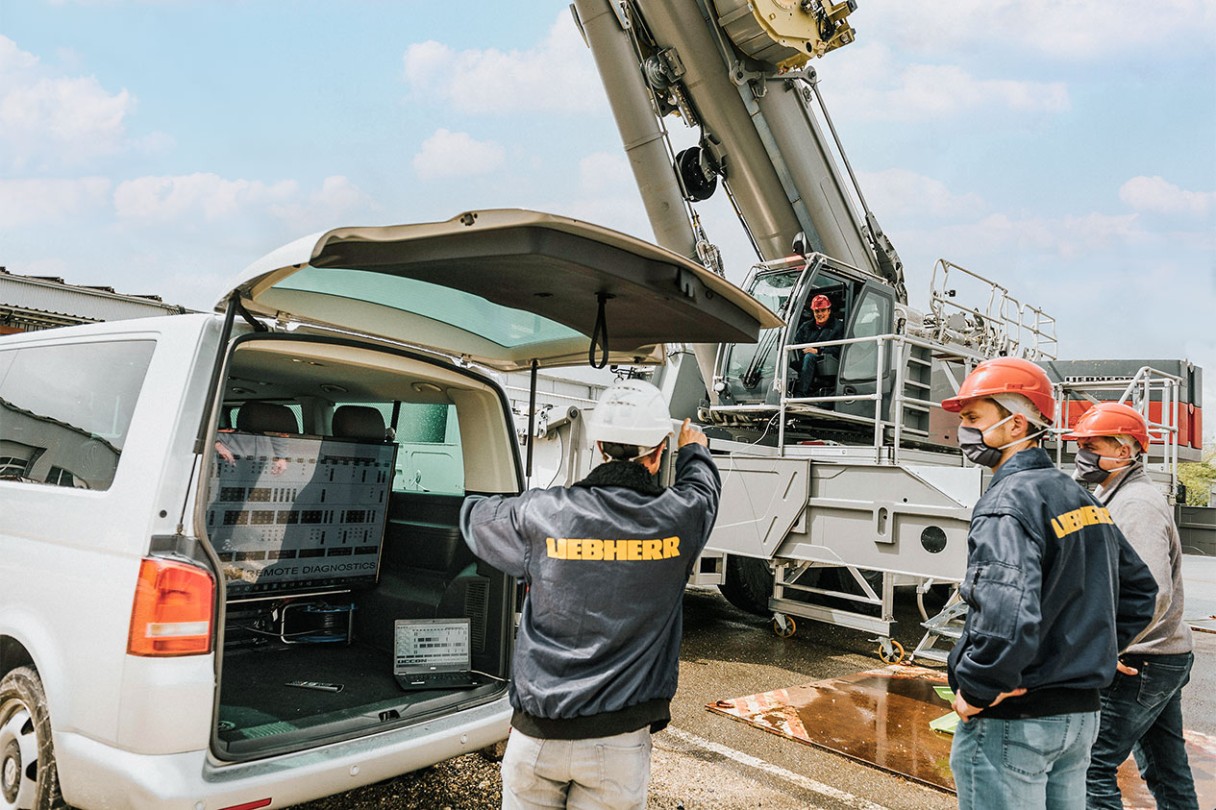
Live broadcast: The LICCON2 screen is broadcast live so that as many people as required can watch.
So how do we regard the work of emergency service crane experts in this situation?
Höchstädter: All our deployment managers are genuine crane experts and normally have the benefit of decades of experience as fitters. They can visualise the situation on the crane with their eyes shut, ask the right questions and often even supply the answer to the technical problem, providing immediate help. Video calls and the remote diagnostic software mentioned before are also part of our digital toolbox. If the deployment manager decides to send a service technician to the crane, an attempt is always made to clarify as much as possible in advance. What spare parts does he need to take with him? What must the technicians know? Every department has to be involved in the deployment – purchasing, spare parts warehousing, logistics and shipping. Ultimately, our main aim is to get the crane operating again as soon as possible. Even during the pandemic and despite travel restrictions we were able to maintain this service pretty well using our own PCR facilities for coronavirus tests.
What do you think we are learning from this pandemic?
Buchmüller: The pandemic has shown us how important the diversification of transport and logistics solutions is. We will attach a great deal more value to this in the future, ensuring we always have a plan B. I personally also hope that the increased recognition given to the transport and logistics sector by the public continues afterwards, just like the health sector. We have several challenges to face as a company over the next few years in this respect, starting with a lack of truck drivers and the necessity to make this profession more attractive again and there is also the development of the infrastructure, of course.
Dambacher: We have been faced with an exceptional situation for the last one and a half years – and despite this, our supply chain has continued to work. This is our reward for maintaining long term, fair partnerships with our suppliers. I am already looking forward to all the personal talks we will have together about how we continue our working relationships and grow together. I believe we have all got plenty of opportunity to improve in the future.
De Fiore: It is important that the management staff keep a cool head in a situation like this so that they can meet the expectations of the workforce and show them that “I’m here for you!”. Emergencies create invention and force us to embrace progress! Unfortunately, we are also learning that social contacts suffer massively due to measures such as social distancing. We have people working for us who originate from 20 different countries. A pandemic means that they are unable to visit their own families in other countries during their holidays. We have to learn to deal with this. And we have also developed a great deal – I’m not sure we would be so far advanced with our digital media if it had not been for the coronavirus.
Behmüller: These digital challenges have been a massive benefit. Advanced and basic training must continue, even during a pandemic. The combination of online and face-toface formats is definitely an approach that we would like to build on after the pandemic is over.
This partnership as equals cannot be underestimated.
Höchstädter: If we can take anything positive from the pandemic, it is that it has been a sort of catalyst for remote service, in other words it has accelerated the process of digitalisation. We will definitely continue along this route, particularly in technological terms, to ensure that we can provide our customers with efficient services in the future. During the pandemic we have had to overcome obstacles together with our customers quickly and with great flexibility. This partnership as equals cannot be underestimated. We will continue to overcome the challenges facing us currently and in the future on the basis of this solid foundation.
This article was published in the UpLoad magazine 02 | 2021.

